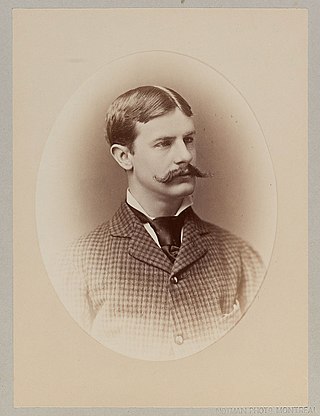
Malcolm Edwin Nichols was a journalist and American politician. Nichols served as the Mayor of Boston in the late 1920s. He came from a Boston Brahmin family and is the most recent Republican to serve in that post.

The mayor of Boston is the head of the municipal government in Boston, Massachusetts, United States. Boston has a mayor–council government. Boston's mayoral elections are nonpartisan, and elect a mayor to a four-year term; there are no term limits. The mayor's office is in Boston City Hall, in Government Center.

Edmund March Wheelwright was one of New England's most important architects in the late nineteenth and early twentieth centuries, and served as city architect for Boston, Massachusetts from 1891 to 1895.

John E. Kerrigan was an American politician, the acting mayor of Boston in 1945 after then-Mayor Maurice J. Tobin became governor of Massachusetts.

George Albee Hibbard was an American political figure who served as the mayor of Boston from 1908 to 1910.

Josiah Quincy VI was an American politician from Massachusetts who served as mayor of Boston from 1896 to 1900. A member of the Quincy political family, his grandfather Josiah Quincy IV and great-grandfather Josiah Quincy III also had served as mayors of Boston.

Edwin Upton Curtis was an American attorney and politician from Massachusetts who served as the mayor of Boston (1895–1896). Later, as Boston Police Commissioner (1918–1922), his refusal to recognize the trade union formed by the department's officers provoked the 1919 Boston Police Strike.

Bruce Carlton Bolling was a politician and businessman in Boston, Massachusetts. He was a member of the Boston City Council and served as the council's first black president in the mid-1980s. He unsuccessfully ran for mayor of Boston in 1993.

John Robert Murphy was a Massachusetts politician and attorney who served as the Commissioner of the Boston Fire Department, Chairman of the Boston Finance Commission and in both branches of the Massachusetts legislature.
Boston City Council elections were held on November 6, 2001. Nine seats were contested in the general election, as the incumbents for districts 1, 5, 8, and 9 ran unopposed. Two seats had also been contested in the preliminary election held on September 25, 2001.
Boston City Council elections were held on November 4, 2003. Nine seats were contested in the general election, as the incumbents for districts 2, 3, 5, and 7 ran unopposed. Six seats had also been contested in the preliminary election held on September 23, 2003.
The Boston mayoral election of 1925 occurred on Tuesday, November 3, 1925. Malcolm Nichols, a former member of the Massachusetts House of Representatives and Massachusetts Senate, defeated nine other candidates to be elected mayor.
The Boston mayoral election of 1914 occurred on Tuesday, January 13, 1914. James Michael Curley, member of the United States House of Representatives, was elected Mayor of Boston for the first time, defeating Thomas J. Kenny, president of the Boston City Council.
The Boston mayoral election of 1910 occurred on Tuesday, January 11, 1910. John F. Fitzgerald, who had been Mayor of Boston from 1906 to 1908, defeated incumbent George A. Hibbard and two other candidates.
The Boston mayoral election of 1907 was held on Tuesday, December 10, and saw Republican nominee George A. Hibbard defeat Democratic incumbent John F. Fitzgerald as well as Independence League nominee John A. Coulthurst. Ahead of the general election, primary elections for each party had taken place on Thursday, November 14, 1907.
The Boston mayoral election of 1905 took place on Tuesday, December 12, 1905. Democratic nominee John F. Fitzgerald defeated Republican nominee Louis A. Frothingham and four other contenders to win election to his first term as Mayor of Boston. Ahead of the general election, primary elections had been held on Thursday, November 16, 1905.
The Boston mayoral election of 1903 occurred on Tuesday, December 15, 1903. Democratic incumbent Patrick Collins defeated Republican nomknee George N. Swallow and two other contenders to win a second term.
The Boston mayoral election of 1899 occurred on Tuesday, December 12, 1899. Republican candidate Thomas N. Hart defeated Democratic nominee Patrick Collins and two other contenders, to become mayor for a second tenure. Incumbent mayor Josiah Quincy had announced in July 1899 that he would not seek re-election.
The Boston mayoral election of 1897 occurred on Tuesday, December 21, 1897. In a rematch of the previous election, Democratic incumbent mayor Josiah Quincy defeated Republican former mayor Edwin Upton Curtis to win re-election to a second term. In addition to Curtis, Quincy also defeated two minor challengers.
The Boston mayoral election of 1895 occurred on Tuesday, December 10, 1895. Democratic nominee Josiah Quincy defeated Republican incumbent mayor Edwin Upton Curtis and one other contender to win election to his first term.











